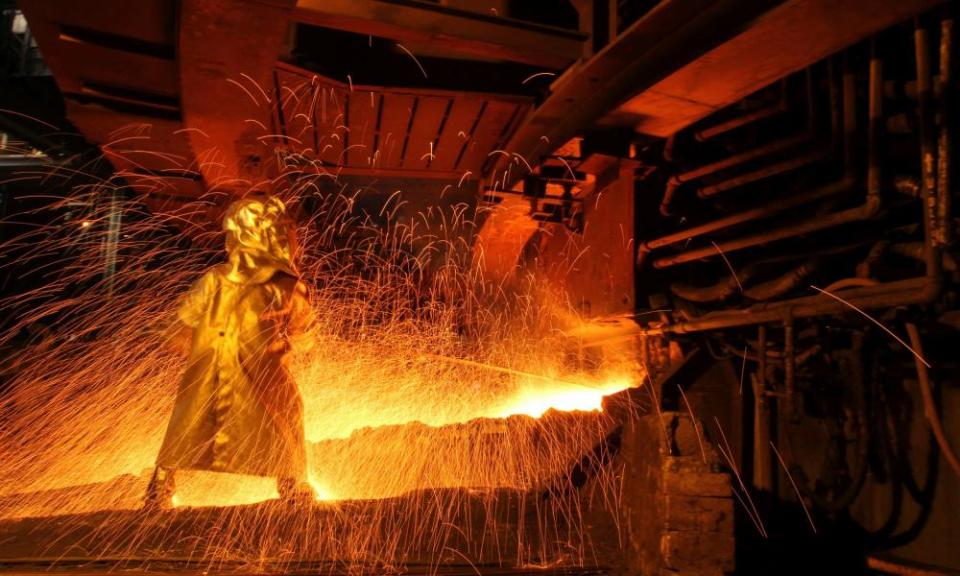Nickel mining: the hidden environmental cost of electric cars

As countries the world over legislate to phase out petrol and diesel cars, attention is turning to the environmental impact of mining the materials needed for electric vehicle batteries.
This additional scrutiny has largely focused on ethical concerns with cobalt and lithium supply chains, despite Tesla CEO Elon Musk’s observation last year that the lithium ion batteries his vehicles use are mostly made of nickel and graphite, with lithium itself merely “the salt on the salad”.
But the extraction of nickel – predominately mined in Australia, Canada, Indonesia, Russia and the Philippines – comes at an environmental and health cost.
Plumes of sulphur dioxide choking the skies, churned earth blanketed in cancerous dust, rivers running blood-red – environmental campaigners have painted a grim picture of the nickel mines and smelters feeding the electric vehicle industry.
The Philippines this year closed or suspended 17 nickel mines because of environmental concerns.
Miners struggling with low nickel prices have welcomed rising demand from an industry that the International Energy Agency estimates will deploy up to 70m electric vehicles by 2025 (pdf).
It is coming on too slowly for some – the Ravensthorpe mine in Western Australia became the latest in a long line of nickel projects to be marked for closure in September. But on the same day in the same state, Anglo-Australian mining giant BHP Billiton unveiled plans for a $43m (£33.5m) processing plant to supply 100,000 tonnes of nickel sulfate per year to the emerging battery market.
Carey Smith, a senior analyst at Alto Capital, says BHP Billiton has deep enough pockets to hold on for the electric vehicle boom, but notes it is only doing so after failing to sell its unprofitable Nickel West business due to an estimated A$1bn (£616m) in environmental clean-up liabilities.
“They’ve got 40 years worth of slag, which isn’t the cleanest material in world,” Smith says. “It needs to be disposed of carefully, burying it somehow or covering it with clay.”
South32, which spun-off from BHP Billiton in 2015, runs the Cerro Matoso mine in Colombia, where residents of nearby communities and mine workers have reported elevated rates of deformities and respiratory problems associated with exposure to pollution generated by nickel mining and smelting (pdf).
A BHP Billiton spokesperson told the Guardian all the company’s projects met environmental approval requirements.
Dr David Santillo, a senior scientist at Greenpeace Research Laboratories, says : “The mining of nickel-rich ores themselves, combined with their crushing and transportation by conveyor belt, truck or train, can generate high loadings of dust in the air, dust that itself contains high concentrations of potentially toxic metals, including nickel itself, copper, cobalt and chromium.
“We have to get smarter at recovering and reusing the vast quantities that we have already extracted from the earth, rather than relying on continued pursuit of new reserves of ever poorer quality and at substantial environmental cost.”
French carmaker Renault, producer of the Zoe, Europe’s best-selling electric vehicle in 2016, said that it recycles almost 70% of the battery weight, although did not specify what proportion of nickel is recycled.
Tesla claims that the nickel in its vehicles is 100% reusable at the end of life, but refused to disclose to the Guardian where the nickel in its car batteries is sourced from.
In a statement a Tesla spokesperson said suppliers were “three or four layers removed from Tesla. It is obviously quite difficult to have perfect knowledge about everything that happens this far down in the supply chain, but we’ve worked extremely hard to gather as much information as possible and to ensure that our standards are being met.”
Robert Baylis, from the mining consultancy Roskill, says entering the electric vehicle supply chain will see nickel miners attract additional scrutiny over carbon emissions.
A 2009 study published in PLOS One concluded that the global warming potential of mining and processing nickel was the eighth highest of 63 metals over the previous year. However, a 2016 Union of Concerned Scientists study (pdf) found that the manufacture and operation of electric vehicles produced less than half the carbon emissions of comparable petrol and diesel-powered vehicles.
Russian mining giant Norilsk Nickel has responded to pressure on carbon emissions and claims to have reduced its use of coal-fired energy by 49% in 2016 (pdf).
“It is of strategic importance to us as a key player in the supply chain that is enabling the growth of electric vehicles and clean energy solutions,” says Larisa Zelkova, vice-president at Norilsk Nickel.
The company has a lot of ground to make up – its home city of Norilsk is rated one of the most polluted cities in the world, thanks largely to the 350,000 tonnes of sulphur dioxide emitted annually by the city’s nickel factory, which was decommissioned last year. In 2016, Norilsk Nickel made headlines when an overflow of oxidised nickel waste turned the city’s Daldykan river red.
Andy Whitmore of the London Mining Network, a coalition of anti-mining campaign groups, says nickel producers should sign up to international standards such as the Initiative on Responsible Mining Assurance.
“I am not sure that nickel has got the attention it deserves,” he says. “Although the mining industry has responded to its critics over the years, mainly we would argue by changes in policies rather than true change in practice, I don’t believe the pressure around [electric] cars has made a difference to date.”

 Yahoo Finance
Yahoo Finance 